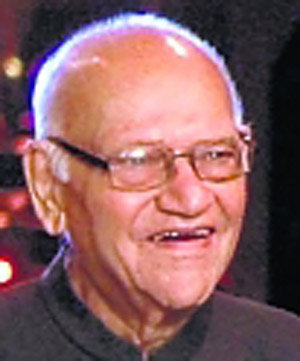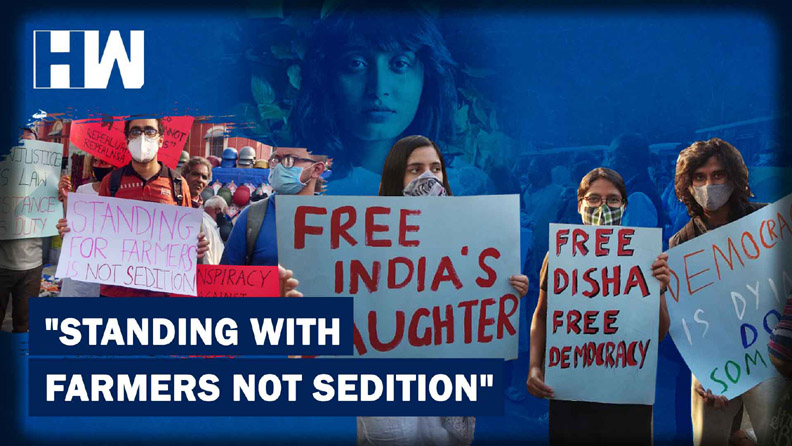
As institutions meant to uphold constitutional morality crumble like ninepins, it is gratifying that judges in high courts and district courts have risen to oppose the steady erosion of values in governance and the diminishing of hope in human minds. Many citizens have voiced concern over the disappearance of logic in courts of law when dealing with activists and those who voiced dissent against government policies.
Judge Dharmender Rana’s order on the bail application of Disha Ravi, the 22-year-old Bengaluru-based climate activist charged with sedition, was awaited by youth with bated breath. There was jubilation when it was announced. The jubilation was muted because of the fear created by the State that made ordinary men and women wonder who would be next. The same fear had gripped Hindu residents of Punjab at the height of terrorism in the ’80s.
Why did the judge grant Disha Ravi’s request for bail and refused Safoora Zargar’s plea for similar relief? The most probable (and charitable) answer would be that Disha was charged with IPC offences only whereas Safoora was saddled with the draconian UAPA, which makes it almost impossible to release an accused on bail.
Both, Disha and Safoora, were in their twenties and wrongly charged with serious crimes like sedition and creating enmity between different classes of citizens. Safoora, incidentally, was a Muslim, six years older than Disha and pregnant to boot. She was protesting against the CAA/NRC laws that discriminated against Muslims.
If it was a fact that the judge secretly was prejudiced against her because of her religious identity, as some seem to doubt, it would have been highly detestable. But that was obviously not so. There are myriad other factors that could have played a part in helping him make up his mind. In Disha’s case the judge had mentioned ‘conscience’ as the principal reason for hesitating to grant the Delhi Police request for further custody. Perhaps, his conscience kept troubling him since the day he rejected Safoora’s plea, made in February 2020.
Over the past year, many citizens have voiced their concern over the gradual disappearance of logic and justice in courts of law when dealing with activists, protesters and those who voiced dissent against government’s policies. The not-very-subtle prejudice of Hindutva loyalists against the largest minority has led to the police in UP and Delhi to pick on issues like ‘love jihad’ and anti-CAA/NRC protests to visit sedition and UAPA charges against relatively peaceful members of the minority community. The crescendo of liberal voices may have had its effect on the judge. After all, he is human like those he faces in the courts every day. The important thing is that he has spoken. He chose his words carefully. They stung the conscience of those who listened. And to those who were not moved, I say ‘where is your humanity’, your milk of human kindness, and above all, your sense of proportion? How can any citizen who is not ideologically committed not be moved when their country men or women are pilloried for opposing policies that they feel are wrong?
It is gratifying to note that there are many judges in the high courts and even sessions courts who have woken up to their remit to dispense justice and decide fairly. In the Delhi HC, Justice S Muralidhar was shifted overnight to the Punjab and Haryana High Court before he could indict the BJP leaders responsible for triggering the NE Delhi riots in February 2020.
In the Aurangabad Bench of the Bombay High Court, Justices TV Nalawade and KK Sonawane quashed the cases against the Indonesian and Malaysian clerics, wrongly accused of spreading Covid by mingling in Muslim localities in different parts of India after contracting it in Delhi. They had attended an annual religious gathering in Delhi of Muslim clerics from Asia. It was bold of these judges to go against the official line of putting the blame for the spread of the disease on the clerics, though it was common knowledge that Covid-19 had proliferated across classes, communities and geographies in India.
A Division Bench of the Allahabad High Court’s Lucknow Bench took suo motu notice of the inhuman act of the UP Police in preventing the parents and relatives of a Dalit girl, who had been raped and killed by four upper-caste youths, from performing her last rites. The court was aware that the UP Government was batting for upper caste youth since the local Rajput community had come out in favor of the alleged culprits. Yet, the judges acted as per their conscience.
Even in Gujarat, Modiji’s and Amit Shah’s parent state, the Chief Justice and Justice Pardiwala ruled against a demand of assorted Hindutva groups to permit a rath yatra in Ahmedabad in violation of Covid restrictions. Since those aligned with the ruling party were allowed a free run in most matters, this order in Modiji’s own backyard was least expected.
We have judges who are firm in insisting on doing their bit to uphold the independence of the judiciary. These recent decisions, particularly in the Disha case, and soon afterwards in Nodeep Kaur’s case by the Punjab and Haryana High Court, have revived hopes among common citizens that justice will prevail. Just as we were losing hope, our spirits have revived.
The Modi government has been charging activists with sedition, though the judgment in Kedar Nath v/s State of Bihar is now settled law. This government and the police forces under its command can only be brought to heel if the SC foists contempt notices on the offending police officers whenever the Kedar Nath judgment is breached.
It is pertinent that the lower courts have taken up the task of disciplining errant police officers out to please their political masters. Thank goodness for judge Rana and the high court that set free Nodeep Kaur. They are the harbingers of justice. If injustice is allowed to proceed unchecked, our India would not be a land of ‘achhe din’.
(The author is a retired IPS officer)
